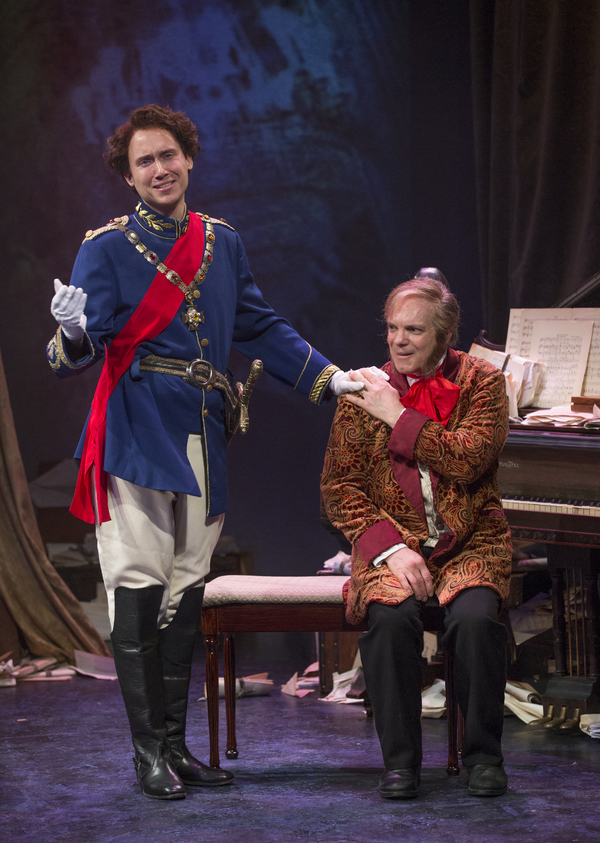Review: Eddie Korbich Plays Brilliant But Bigoted Richard Wagner in Allan Leicht's MY PARSIFAL CONDUCTOR
"A Jew? In heaven? Jews?" an incredulous 92-year-old Cosima Wagner asks her delirium-induced vision of her long-gone husband, Richard, at the outset of Allan Leicht's history-based My Parsifal Conductor.

(Photo: Carol Rosegg)
"Not nearly as many as there seem to be," quips the exalted 19th century composer of lengthy operas glorifying German culture. "Totally powerless, but disproportionally influential."
The year is 1930 and the setting is Haus Wahnfried, the grand villa in Bayreuth, Bavaria the two shared until Richard's death nearly fifty years earlier. Before the decade is over, Adolph Hitler will have appropriated the work of Richard Wagner as the musical symbol of his Third Reich, but for now the deathbed-ridden widow is fearful for her place in the afterlife.
Played by Claire Brownell, Cosima turns to the audience, who she regards as a celestial court of angels. While her husband's anti-Semitic views, consistent with the casual racism of his time, were well known, his genius, she concludes, surly gained him automatic entry into heaven. Her entry, she believes, will require some pleading to the court.
So the playwright flashes back to the events surrounding the 1882 Bayreuth Festival world premiere of Wagner's final opera, "Parsifal," about a knight's quest for the Holy Grail.
As played by musical theatre favorite Eddie Korbich, the brilliant but bigoted Richard Wagner is a comically animated fellow, full of energy and a crackling wit, devoted to pleasing his ardent fans, known as Wagnerites, and reveling in their adoration.
And while he's grateful that Bavaria's King Ludwig II (smooth and charming Carlo Bosticco) will grant him the Royal Munich Court orchestra and choir for the premiere of his latest work, he's completely shocked that the honor includes the artistic services of their extraordinary conductor Hermann Levi, a descendant of 900 years of German Jews, including twelve rabbis.
"'Parsifal' is a sacred Christian work," the composer pleads. And although he claims Levi to be a friend, Wagner fears a revolt by his Wagnerites ("Tens of thousands of true Germans") should a Jew conduct it. Nevertheless, the king is unmoved.
Levi is played with cool intelligence by Geoffrey Cantor and the play is at its best when the conductor, secure in enjoying the upper hand, observes Wagner's wild desperation in his attempts to resolve the situation, including trying to convince Levi to convert to Christianity before the performance. While Korbich is very funny, his portrayal is carefully measured to allow the audience to laugh at Wagner's anti-Semitism, rather than with it.
(Photo: Carol Rosegg)
Issues of separating the work of artists from deplorable aspects of their personal lives are explored, but the main focus of My Parsifal Conductor is Cosima facing up to her own bigotry. Brownell is perfectly fine in the leading role, but the men (including Logan James Hall as a dashingly sexy Friedrich Nietzsche, her onetime lover) get all the best material and are far more interesting.
The very talented Alison Cimmet has little time on stage as Cosima's maid and Jazmin Gorsline doubles as another maid and as Scottish soprano Carrie Pringle.
MY PARSIFAL CONDUCTOR is billed as "a Wagnerian comedy," and while Leicht's script may contain a few more laughs than there are in "Götterdämmerung," it's director Robert Kalfin's light comedic touches (including some clever business executed by set designer Harry Feiner) played by a terrific cast that make the evening fly. The current Off-Broadway production by The Directors Company is the play's world premiere, and if the intention is to make serious points through laughter, both aspects need to be strengthened.
Reader Reviews



